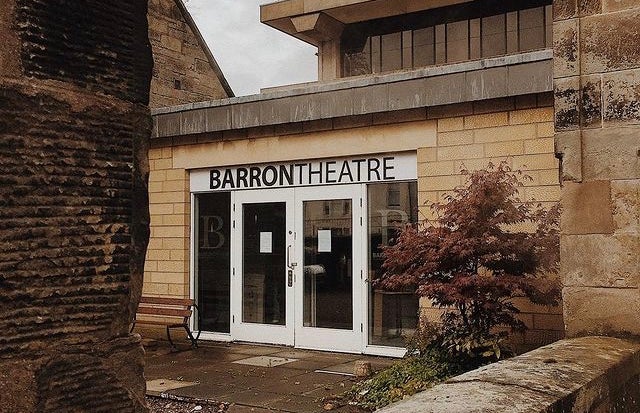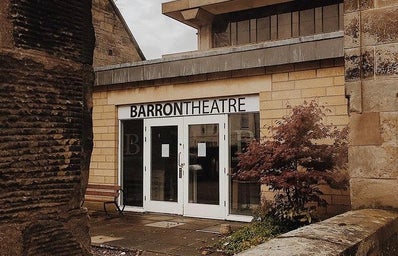On January 12th, Dr. Katie Stevenson, vice principal of collections, called a meeting to tell student leaders in the arts community about the University’s plan to close the Barron Theatre permanently, effective immediately. While the University had been threatening this closure for years, citing the liability of continuing to operate a space that was, admittedly, not up to code, they had never consulted officially with students regarding plans to take more serious steps towards closure, and the news came as a tremendous shock to the arts community. Subsequent to the announcement on the 12th, students began to take action. A petition was created which, as of January 28th, has 2,448 signatures, as well as countless comments from students and alumni alike pleading with the University not to close a space that rests at the very heart of student theatre in St Andrews.
For context, the Barron is one of only three entirely student-run theatres in the UK. Nestled in the shadow of the library, the intimate 54-seat blackbox plays host to nearly 30 shows, as well as countless rehearsals, workshops, master classes, events, and auditions each year. In addition to the theatre space, the Barron also houses a fully functioning set shop, costume and props storage, and office space for student key-holders. The Barron is in operation practically 24/7, with the method of scheduling ‘for-students-by-students’ facilitating rehearsals at odd hours. Indeed, it is this autonomy that makes the Barron so special. “It is the sole reason that St Andrews has such a vibrant performing arts scene,” says Barron manager Cate Hanlon.
The Barron provides students with invaluable hands-on experience both on stage and behind the scenes, experience which has launched the careers of many St Andrews alumni now working professionally in the industry. Every fall, it houses the Fresher’s Drama Festival, a beloved tradition which gives first year students the opportunity to try their hand at every element of putting on a production, and which usually results in 10-12 shows. The festival has been a pivotal launching point for many a budding thespian over the years. “I know that I personally would not have had the confidence to mount a production of my own writing in my first year had it not been for the safety cushion offered by the space,” says Matthew Gray, a third year student writer, director, and performer. “The experience of that production provided me with an invaluable assuredness which I believe has encouraged me to continue pursuing a career in the arts.” “It’s a great venue to build confidence,” echoes another student director. Additionally, each spring, the space serves as a key location during the On the Rocks festival, the largest student-run arts festival in the UK. A recent alumna, who requested to remain anonymous, told Her Campus how “many, myself included, launched their performing arts careers within these walls, whether onstage or learning the intricacies of teching or costuming a show.” She added that, in many ways, the Barron compensates for the University’s lack of a theatre or music program, with the “hands-on” approach the Barron facilitates enabling “an impressive number of young and highly skilled practitioners to leave the University despite it not having a performing arts course.” In short, and despite this author’s best efforts to do so, the Barron provides innumerable and invaluable resources for the arts community of St Andrews, resources which simply cannot be replicated by the current proposed alternatives.

In response to the overwhelming backlash from current students and alumni alike in reaction to this announcement, the University called an open forum meeting this past Friday, January 22nd, where students could voice their concerns. The meeting was hosted by Dr. Katie Stevenson – who was, unfortunately, woefully unprepared for the extent of upset and frustration with which she was faced – and Gavin Sandford, the Director of Student Development and Activities. Also in attendance were Kally Lloyd-Jones and Jess Richards, newly minted directors of the Byre Theatre, and over 100 students and alumni clamoring to be heard.
Dr. Stevenson opened the meeting by saying that up until now, the University “had not had time” to put together the information for the students regarding the plans for closing the Barron, a claim students found troublesome given that Dr. Stevenson had prefaced the statement with the reality that the plan to close the Barron was something the University had been working on “since late last year.” Nevertheless, Stevenson said she was delighted to share the plans, and genuinely seemed so. She went on to explain the longstanding issues with the Barron Theatre (namely the risk of its continued operation when the building is not up to code and therefore unsafe, and indeed the expense of maintaining the space in general), but expressed her belief that the University-proposed solution would “maintain the essence” of the Barron Theatre. Unfortunately (and herein lies the crux of the issue), that is simply not the case, as students subsequently went to some pains to illustrate.
During the meeting, students spoke calmly and eloquently, endeavoring to explain why the Barron is so important to the arts community, and why the proposed substitution of the Byre studio would simply not suffice. Indeed, the award for most outspoken advocate would in all likelihood be given to Dr. Joe Carson, a professor of French who also serves as the faculty chair of the student drama advisory group and Barron fund committee, who was quite open when voicing his frustrations with how the University had handled the situation, especially the fact that he had only been informed of the planned closure 24 hours previously. The general consensus was that while the University may truly have believed they were acting in the best interest of the students and that they were providing student creatives with a comparable space in the Byre studio, had any students been consulted in advance of the decision, they could have informed the University of the substantial issues with the proposed plan. Gavin Sandford confirmed that the first time the Students’ Association was contacted about the plan, it was simply with an announcement that the Barron was closing and not a discussion of student needs.
Perhaps the greatest point of frustration that arose during the course of the meeting was the discovery that there is as yet no official plan for what the Barron space will be used for. Stevenson explained that the space is merely “part of a plan that is designed to increase study space across the entire precinct,” but that no actual budget, plans, or designs have been put forward for the actual reconfiguration of the Barron space. “It has had some preliminary thought put to it by the estates master plan,” Stevenson said, “but it hasn’t been thought through.”
Clearly.
After two and a half hours of frustrating and frequently cyclical debate, the meeting was called to a close, with many student voices left unheard and questions unanswered. An alumna who attended the meeting shared with Her Campus after the fact her belief that the issue has been “completely mismanaged” by the University, and furthermore that she was “shocked at how representatives of the University as an institution spoke to and regarded students in such a dismissive, patronizing, and all together inappropriate manner.”
Indeed, as students have had time to process the University’s decision, many have begun to express that their real issue with the plan to close the Barron is not the closure itself, but rather the complete failure to include students in the decision process. “I think the way this was handled was gross, and demonstrates once again that the University feels it can just prescribe instead of engage in a dialogue with students,” says Gray. “The arguments behind it were not totally invisible to students, but the lack of visibility and negotiation was appalling,” he adds. Recent graduate Theodore Day, the founder of the University’s Opera Society and an active participant in the University’s musical and dramatic organizations during his time, reiterated this idea that the Barron closure is but a piece of a larger overarching issue of communication. He told Her Campus that “the University’s decision to close the Barron with no consultation with the students that use the space is sadly all too typical of how the university at best takes its student-run performing arts for granted, and at worst seems to outright oppose them.” While the decision to close the Barron was certainly not made out of opposition to student theatre in general, it was made without any effort to determine student needs beforehand. Nearly all students can agree that the Barron did have serious operating issues – most critically those related to health and safety – and even that perhaps a different space might better be able to meet student needs. However, without first discussing the issue with students, the University had no way of anticipating what those needs might be. “I think we need to fight so that future decisions are handled much better and with far better communication,” says Gray. We don’t want future generations of students to have to fight so hard to save whatever their “Barron” might be.



